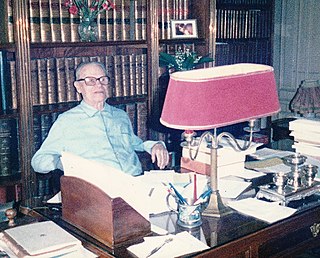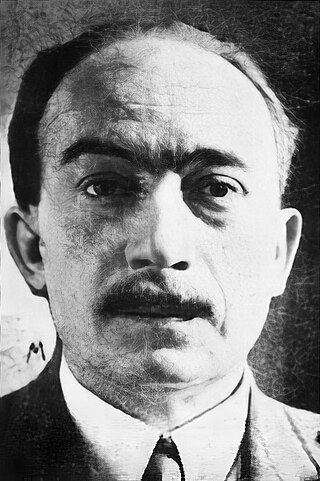Related Research Articles

Victor de Riqueti, Marquis de Mirabeau was a French economist of the Physiocratic school. He was the father of Honoré, Comte de Mirabeau and André Boniface Louis Riqueti de Mirabeau. He was, in distinction, often referred to as the elder Mirabeau as he had a younger brother, Jean-Antoine Riqueti de Mirabeau (1717–1794).
Djibril Tamsir Niane was a Guinean historian, playwright, and short story writer.

Camille-Ernest Labrousse was a French historian specializing in social and economic history who was born in Barbezieux, Charente and died in Paris.
Michel Abitbol is a Moroccan-Israeli historian.
Roland Mortier was a prominent Belgian scholar, philosopher and academic, known for his contributions to linguistics and literature. Mortier obtained his PhD in Philology, specialisting in 18th century literature and Franco-German reports, from the Université Libre de Bruxelles in 1946. He was a member of the Académie royale de langue et de littérature françaises de Belgique and the Académie des Sciences Morales et Politiques. In 1965, he was awarded the Francqui Prize on Human Sciences.

Tristan Klingsor, birth name Léon Leclère, was a French poet, musician, painter and art critic, best known for his artistic association with the composer Maurice Ravel.

Henri Brosselard-Faidherbe (1855–1893) was a French military officer and explorer.
Pierre Chaunu was a French historian. His specialty was Latin American history; he also studied French social and religious history of the 16th, 17th, and 18th centuries. A leading figure in French quantitative history as the founder of "serial history", he was professor emeritus at Paris IV-Sorbonne, a member of the Institut de France, and a commander of the Légion d'Honneur. A convert to Protestantism from Roman Catholicism, he defended his far-right views most notably in a longtime column in Le Figaro and on Radio Courtoisie.
Frédéric-Eugène Godefroy, was a French author, notable for his works on the history of the French language, notably compiling a 10-volume Old French dictionary of over 20,000 pages.

Charles Pellat was a French Algerian academic, historian, translator, and scholar of Oriental studies, specialized in Arab studies and Islamic studies. He was an editor of the Encyclopaedia of Islam published by Brill Academic Publishers, and a member of the Académie des Inscriptions et Belles-Lettres.
Geneviève Hasenohr is a French philologist and prolific scholar of medieval and Renaissance French literature. She has authored or contributed to more than forty books, written at least fifty academic articles and reviews, and prepared numerous scholarly editions.

Jules-Joseph Guiffrey was a 19th-century French art historian, a member of the Académie des beaux-arts.
Daniel Moulinet is a French priest and historian, professor of contemporary history at the Catholic University of Lyon.

Émile Mireaux was a French economist, journalist, politician and literary historian. In the 1930s, he edited Le Temps and contributed to other right-leaning journals. He became a senator in 1936, and briefly served as a minister in 1940. From 1940 until his death, he held a chair in political economy, statistics and finance at the Académie des Sciences Morales et Politiques.
Charles Monteil was a French civil servant who combined a career in administration with studies in the ethnology, languages, and history of French West Africa.

The Nantes slave trade resulted in the deportation, from the late 17th to the beginning of the 19th century, of more than 500,000 black African slaves into French ownership in the Americas, mainly in the Antilles. With 1,744 slave voyages, Nantes, France, was the principal French slave-trading port for the duration of this period. The slave trade was explicitly encouraged by the royal family and described by the church as an "ordinary occupation."

Claude-Hélène Perrot was a French historian and Africanist who specialized in the history of Côte d'Ivoire. She served as a professor of contemporary African history at the Paris 1 Panthéon-Sorbonne University from 1983 to 1993. Perrot's main areas of research concerned the history of the Akan of Côte d'Ivoire and Ghana before colonization, mainly the Anyi and the Eotile; the use of oral tradition by historians; as well as relations between traditional African religions and political power. She was honored as Commander, Order of Ivory Merit.
Étienne Taillemite was a French historian and archivist.
The Prix Bordin is a series of prizes awarded annually by each of the five institutions making up the Institut Français since 1835.
Pierre Léon was a French historian.
References
- 1 2 3 4 5 Garrigoux, Alice (1950). "Madame Jacques Bénet, née Simone Berbain (1915-1949)". Bibliothèque de l'École des chartes. 108 (1): 198–199.
- 1 2 "Relations économiques de la France avec la Guinée de 1664 à 1797". theses.enc.sorbonne.fr. Retrieved 2020-01-02.
- 1 2 Berbain, Simone (1942). Le comptoir français de Juda (Ouidah) au XVIIIe siècle (in French). Paris: Larose. OCLC 2917172.
- 1 2 3 4 Delmas, Bruno (2011). "Jacques Bénet (1915-2009)". Bibliothèque de l'École des chartes. 169 (2): 667–670.
- ↑ Berbain, Simone; Institut Français d'Afrique Noire (1942). Études sur la traite des noirs au Golfe de Guinée: le comptoir français de Juda (Ouidah) au XVIIIe siècle (in French). Paris: Librairie Larose. OCLC 68036568.
- ↑ Donn; Bour, Henri; Berbain, Simone; Durand, Paul (1945). Les comités d'organisation: un bilan, octobre 1944 ... (in French). Paris: Librairie sociale et économique. OCLC 460620881.